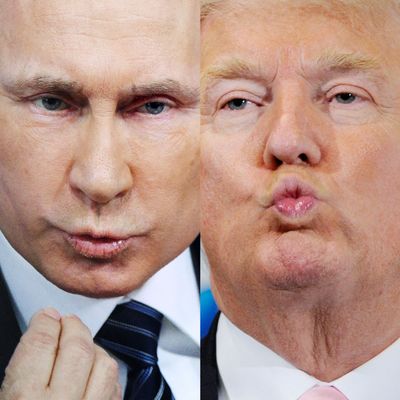
The universal headline summary of Donald Trump’s prepared foreign-policy speech yesterday was that it lacked details. Trump’s campaign encouraged this conclusion by leaking in advance that it would contain few specifics, and media correctly primed to think of Trump as an ignorant blowhard covered it as such. But the speech, in fact, contained an important and somewhat-curious idea: The United States should form a closer relationship, even an alliance, with Russia. To get the thrust of Trump’s point, it has to be read in full context, which he presented in counter-position with his policy toward China:
We desire to live peacefully and in friendship with Russia and China. We have serious differences with these two nations, and must regard them with open eyes, but we are not bound to be adversaries. We should seek common ground based on shared interests.
Russia, for instance, has also seen the horror of Islamic terrorism. I believe an easing of tensions, and improved relations with Russia from a position of strength only is possible, absolutely possible. Common sense says this cycle, this horrible cycle of hostility must end and ideally will end soon. Good for both countries.
Some say the Russians won’t be reasonable. I intend to find out. If we can’t make a deal under my administration, a deal that’s great — not good, great — for America, but also good for Russia, then we will quickly walk from the table. It’s as simple as that. We’re going to find out.
Fixing our relations with China is another important step — and really toward creating an even more prosperous period of time. China respects strength and by letting them take advantage of us economically, which they are doing like never before, we have lost all of their respect.
We have a massive trade deficit with China, a deficit that we have to find a way quickly, and I mean quickly, to balance. A strong and smart America is an America that will find a better friend in China, better than we have right now. Look at what China is doing in the South China Sea. They’re not supposed to be doing it.
In the broad thematic sense, Trump is treating Russia and China the same: promising vaguely to make great deals with them. A slightly closer read, however, reveals that he is proposing virtually opposite policies toward them. Trump identifies ways in which China is acting against American interests: by running a trade surplus with us, and by expanding into the South China Sea. Trump proposes to “mend” relations with China by standing up to them and forcing them to respect us as equals, after they have supplied unilateral concessions to us.
His depiction of American relations with Russia is completely different. Trump does not identify any hostile Russian behavior that must change. This is telling since, having singled out China’s muscle-flexing in the South China Sea, he ignores Russia’s much more flagrant bullying of its neighbors, such as Ukraine, whose territory it has gobbled up. Instead he identifies “shared interests” with Russia — opposition to Islamic terrorism — and proposes to end “this horrible cycle of hostility.” Describing American-Russian relations as a cycle of hostility assigns the blame to both sides, rather than to Putin’s aggressiveness.
So Trump is signalling a clear turn in American policy, which under his administration would ramp up hostility toward China and wind down hostility toward Russia. This is in keeping with Trump’s long-standing views on both countries (not just China, which he has mocked and taunted, sometimes in pidgin, from the outset of his candidacy.) Trump has deep affection for Russia and its corrupt, misogynistic dictator. “I think I would just get along very well with Vladimir Putin,” Trump announced in July. Last December, after Putin praised Trump, the Republican front-runner returned the favor: “It is always a great honor to be so nicely complimented by a man so highly respected within his own country and beyond.” When asked about his embrace of a dictator who has murdered journalists, Trump replied last year, “It’s never been proven that he’s killed anybody. So, you know, you’re supposed to be innocent until proven guilty.”
Comments like this are merely the superficial manifestation of a deepening alliance. Franklin Foer has a long and fascinating report for Slate on Paul Manafort, the Trump campaign manager (and long-standing confidant) who has also worked to undermine Putin’s enemies in Ukraine. And, as Michael Crowley details in Politico magazine, Russia Today, the Kremlin propaganda organ, routinely lionizes Trump. Both stories depict sides of the same phenomenon: Russia’s campaign to cultivate influence in the West by corrupting members of the American media and political Establishment.
To the degree they have attacked him on foreign policy, Trump’s critics in both parties have mostly confined themselves to the themes that are digestible extensions of his personal style — he is ignorant, inconsistent, temperamentally unfit to lead, and a danger to blunder the country into war. All of those charges are true, yet they manage to deny something that, in a candidate without such flamboyant drawbacks, would itself be a campaign-threatening scandal: Trump is Vladimir Putin’s stooge.






























